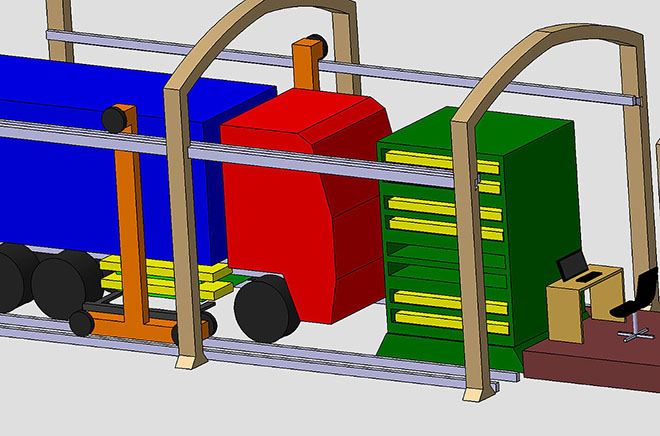Berlin Technical University Professor Stefanie Marker conducts research on EV energy optimization. In her latest project, she turns her attention to vehicles weighing up to 40 tons. The majority of these heavy goods vehicles must travel distances that cannot be covered by a single battery charge. Her solution: a network of battery exchange stations for heavy goods vehicles. They would just have to drive in, exchange the battery, and continue on their way. “What we are missing is a feasibility study,” said co-researcher Jens-Olav Jerratsch.
As part of the three-year project, which will run until the end of September 2023, the consortium is commissioning two electrified trucks for use by two logistics companies. A battery exchange station is being developed in south Berlin to be used by haulers as part of their regular delivery operations. The goal is to provide a fully automated battery exchange. Upon arrival at the station, the spent battery is removed from the vehicle by a specially developed robot and exchanged for a fully charged battery. This can be done in a matter of minutes.
“Both vehicles are fitted with a number of sensors to record data affecting energy consumption during regular operations: the energy consumption of the engine, the load, the weather, the altitude profile of the route, secondary energy consumption such as air conditioning in the driver’s cabin, as well as the energy required to maintain cargo hold temperatures,” said Marker.
“We will be examining how to mount and bond batteries to trucks to enable a fast and easy exchange,” said Jerratsch. In the long term, another challenge lies in standardizing exchangeable batteries so as to enable cost-effective, modular battery exchange on a larger scale. However, given the limited number of truck models, this may represent less of a problem than for passenger cars.
“Our work in the project also focuses on economic aspects as well as technical and energy consumption data: How to develop a system that makes it possible to provide a cost-effective and real alternative for the logistics branch,” added Marker.
Source: Berlin Technical University

buy lasuna online – order lasuna generic himcolin pills
besifloxacin generic – cheap carbocysteine generic sildamax for sale online
gabapentin 600mg brand – order gabapentin 600mg generic azulfidine 500 mg usa
celebrex sale – buy indomethacin 50mg buy generic indomethacin over the counter
buy voltaren 100mg generic – cambia over the counter aspirin 75mg cheap
rumalaya price – buy rumalaya without a prescription purchase amitriptyline generic
buy mestinon generic – cheap pyridostigmine purchase azathioprine online
diclofenac over the counter – buy isosorbide 20mg sale nimodipine for sale
buy baclofen 10mg generic – ozobax pill generic feldene
cheap periactin – buy cyproheptadine 4 mg generic order tizanidine 2mg sale
mobic 15mg oral – order generic toradol buy ketorolac pills
buy cefdinir 300mg generic – buy cleocin generic
isotretinoin over the counter – buy avlosulfon generic deltasone 40mg brand
oral deltasone 10mg – omnacortil 20mg pills order zovirax without prescription
buy permethrin online – acticin oral retin cream cheap
betnovate 20 gm over the counter – purchase betamethasone purchase benoquin without prescription
flagyl 400mg brand – buy cenforce for sale cenforce 100mg for sale
order augmentin 375mg pills – buy synthroid pill synthroid 75mcg pills
order cleocin 150mg pill – indocin 75mg ca indocin price
losartan 50mg tablet – cheap keflex 500mg cephalexin 125mg tablet
crotamiton for sale online – buy generic eurax buy cheap generic aczone
order modafinil 100mg without prescription – buy modafinil pills for sale melatonin 3 mg ca
cheap zyban 150mg – ayurslim where to buy cheap shuddha guggulu generic
capecitabine uk – mefenamic acid generic danocrine price
progesterone 100mg brand – buy ponstel sale clomiphene sale
order alendronate 70mg pills – generic medroxyprogesterone oral medroxyprogesterone 10mg
buy aygestin 5 mg without prescription – order lumigan without prescription yasmin pills
order generic yasmin – buy estrace 2mg for sale buy arimidex no prescription
cabergoline without prescription – alesse pills buy alesse online
гѓ—гѓ¬гѓ‰гѓ‹гѓійЊ 20 mg еј·гЃ• – г‚ўг‚ュテイン е‰ЇдЅњз”Ё г‚ўг‚ュテイン жµ·е¤–йЂљиІ©
valif despite – valif pills health order generic sinemet 20mg
indinavir buy online – order indinavir diclofenac gel online buy
order promethazine 25mg sale – promethazine 25mg pill lincomycin 500mg us
prednisone price – buy generic captopril capoten 25 mg uk
deltasone 5mg generic – starlix 120 mg uk buy capoten no prescription
isotretinoin usa – buy decadron 0,5 mg sale purchase linezolid sale
buy amoxicillin no prescription – amoxicillin sale ipratropium 100mcg over the counter
zithromax us – order tinidazole generic brand nebivolol
generic omnacortil 10mg – order azipro 500mg online cheap order progesterone 100mg without prescription
order generic neurontin 800mg – order anafranil 50mg for sale buy sporanox 100 mg generic
buy furosemide 100mg online cheap – buy piracetam 800 mg without prescription order betamethasone online cheap
purchase monodox online – monodox cost glucotrol 10mg pill
augmentin 375mg usa – order nizoral 200 mg generic buy generic duloxetine 20mg
buy clavulanate sale – nizoral cost order duloxetine 20mg online
buy semaglutide generic – vardenafil 20mg oral oral periactin